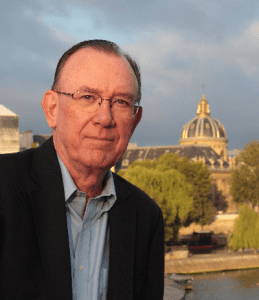 Tell us about yourself and how many books you have written.
Tell us about yourself and how many books you have written.
I write mysteries and thrillers with a strong romantic edge centered on Paris, my favorite city. My first novel was Treasure of Saint-Lazare, a historical mystery about a 16th-century painting stolen by the Nazis that disappeared at the end of World War II and hasn’t been seen since. That much is fact; my novel supposed that a gang of criminals got the idea that a couple of ex-American soldiers or their families knew where the painting had gone and decided to find it at all costs — including several murders. It’s a historical mystery, a thriller, and a romance tied up in one bundle.
Treasure of Saint-Lazare was chosen the top historical mystery of 2014 in the Readers Favorite writing competition. It sold well (reaching #29 among all Kindle books) and is still selling.
Last year I published a sequel, Last Stop: Paris, about the last steps in the efforts to Eddie Grant, the protagonist of both books, to identify and bring to justice the evil genius behind the murders and Eddie’s own near death experience in Sarasota, FL. It was a finalist for the Shelf Unbound Best Indie Book of 2015 award.
What is the name of your latest book and what inspired it?
Last Stop: Paris is a true sequel to Treasure of Saint-Lazare. You can read it as a stand-alone, but it will mean more if you’ve already read Treasure.
The series was inspired by my own time in Paris and my time in Europe years ago as a journalist — World War II is a topic that still resonates with Americans of any generation.
Do you have any unusual writing habits?
I don’t think my habits are unusual, but they’re firm. I do quite a bit of advance research and keep a lot of material in Evernote. I outline using a couple of tools, but Scrivener has become my main choice.
I write my drafts in longhand and then type them into Scrivener. When part of the manuscript is ready for editing, I do that with pencil and paper.
Most of my ideas and notes are dictated into a pocket voice recorder, which Dragon then transcribes and sends to Evernote. I’m experimenting a little with dictation of the manuscript itself, as well. Time will tell about that.
What authors, or books have influenced you?
Every would-be writer of my generation was influenced by John Le Carré, and I’m no exception. I’ve read the classic American authors — Steinbeck, Hemingway, Fitzgerald — and many who are less well known. Among contemporary writers, Ann Patchett is a favorite, as are Alan Furst and Hilary Mantel. I’ve recently read the work of Don DeLillo and Patrick Modiano, the French author who won the Nobel Prize in 2014. I reviewed his “Young Once” on my blog, PartTimeParisian.com
What are you working on now?
My third work will build on the first two, but will introduce an entirely new set of main characters (although the originals won’t be far in the background). It will be set in Miami, Paris, and one other location in Eastern Europe, and will reflect the political chaos left behind by the collapse of the Soviet Union and the efforts of the Eastern European countries to bootstrap themselves into the West’s way of doing business, but succeeding only in transplanting the worst of Russian oligarchy and crony authoritarianism into their own economies. The absolutely predictable result is the turn toward authoritarianism, which looks disturbingly familiar to anyone who’s read the history of Europe in the ’30s.
What is your best method or website when it comes to promoting your books?
After trying a lot of marketing methods I’ve come back to the basic Amazon approach of free days, plus mainly Twitter promotion at other times in the KDP Select cycle. I have a substantial Twitter following (around 16,000), and I use some Facebook ads. Sites like AwesomeGang have been very valuable in building readership around the free periods.
Do you have any advice for new authors?
1. Have a good idea.
2. Think about it a lot, kick out the bad parts, improve the good parts.
3. Put butt in chair and write.
What is the best advice you have ever heard?
#3, above.
What are you reading now?
The top of my Kindle library now is “Earthly Powers,” by Anthony Burgess, which may have the best opening line of all time. Look it up.
What’s next for you as a writer?
I have a half-dozen tentative plots laid out in Evernote and will work through those. When the current book goes to my editor in about three months my plan is to start a longer, sweeping novel about a Franco-American man, heir to an industrial fortune, who takes the unpopular step of joining the U.S. Army long before World War II begins. When Pearl Harbor comes, he’s ready and qualified to be a highly effective military spy behind the German lines in France, where he was born.
If you were going to be stranded on a desert island and allowed to take 3 or 4 books with you what books would you bring?
That is a tough one. I’d want to re-read “Bel Canto,” by Ann Patchett; “All the Light We Cannot See,” by Anthony Doerr; and, on the nonfiction side, “Arguably,” by Christopher Hitchens; and something by Michael Lewis, maybe “The Big Short,” because the characters are so memorable. Also “Stoner,” by John Williams, an old book recently revivified by the New York Review of Books and well worth any writer’s time.
Author Websites and Profiles
John Pearce Website
John Pearce Amazon Profile
John Pearce’s Social Media Links
Goodreads Profile
Facebook Profile
Twitter Account